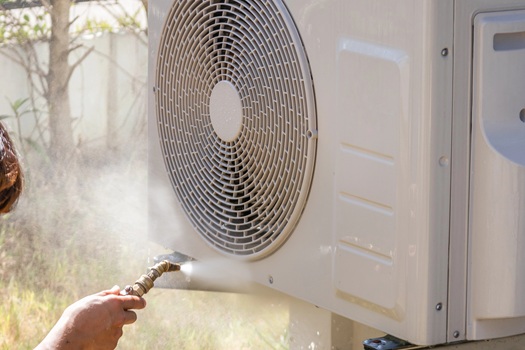
Pressure washing might not be the first thing that comes to mind when thinking about air conditioner maintenance. Yet, over time, outdoor units collect dust, grass, pollen, and general grime that restrict airflow and put strain on the system. That’s where pressure washing can make a real difference—not just for the sake of appearance, but for performance and longevity too. But before grabbing a pressure washer, there are several things to understand. Pressure washing can help your AC run efficiently, but done incorrectly, it can cause costly damage.
- Why Pressure Washing Matters for AC Units
- When Pressure Washing Can Be Too Much
- What’s the Best Way to Pressure Wash an AC Unit?
- Pressure Washing Helps Prevent Long-Term Damage
- Not All Pressure Washers Are Created Equal
- Why DIY Might Not Be for Everyone
- Know When Not to Pressure Wash
- Other Ways to Support AC Health Beyond Pressure Washing
Why Pressure Washing Matters for AC Units
During the summer, air conditioners work harder than usual to keep indoor temperatures comfortable. That heavy use means dirt, leaves, and debris easily gather around the coils and grilles. As this buildup worsens, it affects how well the unit can cool your space. In fact, many breakdowns during summer months trace back to blocked airflow.
Thankfully, pressure washing in Myrtle Beach SC helps clear away those obstructions. It offers a faster, more thorough clean compared to manual scrubbing or rinsing with a hose. More importantly, it gets into the fine crevices without needing to disassemble the entire unit.
However, this method isn’t without its risks. AC units are more delicate than most people assume, so it’s crucial to know the right way to pressure wash without causing harm.
When Pressure Washing Can Be Too Much
Although pressure washing has clear benefits, blasting water at full force can actually do more harm than good. Most outdoor AC units contain delicate fins, coils, and internal electrical components. Excessive water pressure may bend the fins, break connectors, or even puncture the coils. Once that happens, repairs can become costly and time-consuming.
This is why using low-pressure settings is essential. Ideally, the PSI (pounds per square inch) should stay under 1500. Many experts recommend sticking between 1300 and 1450 PSI for safe and effective cleaning. To stay on the safe side, use a wide nozzle tip that spreads water gently. The idea is to rinse and lift dirt—not blast it off.
What’s the Best Way to Pressure Wash an AC Unit?
Although every unit is slightly different, there’s a general step-by-step approach that works well for most setups. First, always switch off the power at the breaker box. This simple step helps prevent electric shock and protects the unit from short-circuiting.
Then, remove any covers or protective grilles to expose the coils. If you spot twigs or leaves stuck inside, pull them out before using any water. Trim back any nearby vegetation, such as grass or bushes, to improve air circulation.
Next, begin rinsing the unit with low-pressure water, keeping a good distance from the surface. Move slowly in vertical motions to dislodge trapped debris. It helps to break the job into sections, working from top to bottom.
If you’re unsure about pressure washing the fins or coil directly, you can always wash the exterior casing instead. Some homeowners in Myrtle Beach SC prefer to rinse with a hose and only pressure wash the bottom frame and side panels. This gentler approach still clears away grime without risking damage.
Pressure Washing Helps Prevent Long-Term Damage
 pressure washing in Myrtle Beach SC
pressure washing in Myrtle Beach SCDirt buildup doesn’t just block airflow—it traps moisture, encourages mold, and leads to overheating. When the unit has to work harder to cool your home, it puts unnecessary wear on the motor and compressor. Over time, this extra strain shortens the unit’s life span.
By keeping the coils and vents clean, pressure washing helps your AC operate efficiently. That often translates to lower energy bills, fewer service calls, and a quieter system overall. It’s one of those tasks that, while small, can save hundreds over the long term.
Not All Pressure Washers Are Created Equal
Before you use just any pressure washer, it’s worth checking its PSI range and nozzle types. Models rated for car or bike washing typically work best for AC cleaning. Avoid commercial-grade machines, as their power is overkill for delicate components.
If you don’t own a pressure washer, consider renting one. There are even portable electric washers made specifically for smaller residential tasks. These models often come with gentle spray settings and accessories tailored for sensitive surfaces.
Why DIY Might Not Be for Everyone
Although pressure washing sounds simple, it still requires caution. A misdirected spray, wrong nozzle, or too much pressure can cause permanent damage. In some cases, homeowners accidentally bend coil fins or crack protective components without realizing it. The damage only becomes noticeable later—often when the AC begins to struggle on the hottest day of the year.
If you feel unsure or uncomfortable doing it yourself, hiring a pressure washing expert in Myrtle Beach SC is a smart move. Specialists know how to clean the unit safely and can spot early warning signs of rust, wear, or leaks.
Know When Not to Pressure Wash
While pressure washing works wonders in the right setting, there are times when it’s best to wait. Avoid washing during extreme heat, right after the unit shuts off, or when there’s visible ice buildup. Always wait for a cool, dry day when the unit is turned off and fully disconnected from the power source.
Additionally, never wash the coils or fins with high-pressure water. This is one of the most common mistakes and can be one of the most expensive. If you absolutely must clean the coils, use a coil cleaner solution and a gentle rinse. The goal is to refresh the system—not dismantle it.
Other Ways to Support AC Health Beyond Pressure Washing
Even though pressure washing plays a role in AC maintenance, it’s not the only step worth taking. For starters, replace filters regularly and clean around the outdoor unit often. Inspect for signs of animal nesting or unusual vibrations. Also, keep gutters clear if the unit sits close to the side of the house.
These small habits help reduce strain on the system and allow for smoother airflow. While pressure washing might only be needed once or twice a year, regular care throughout the season keeps things running optimally.
If you’re looking for guidance or prefer to leave AC cleaning to the pros, K&M Pressure Washing LLC offers dependable pressure washing services tailored for delicate systems like air conditioners. Their technicians use the right equipment and techniques to get the job done without putting your unit at risk.
Call K&M Pressure Washing LLC now to schedule a safe, affordable AC pressure washing service and keep your cooling system performing its best all season long. Whether you need help with a deep clean or routine maintenance, the right care today can help you avoid major repair costs tomorrow.
Like our Facebook page for more great info.

No comments:
Post a Comment